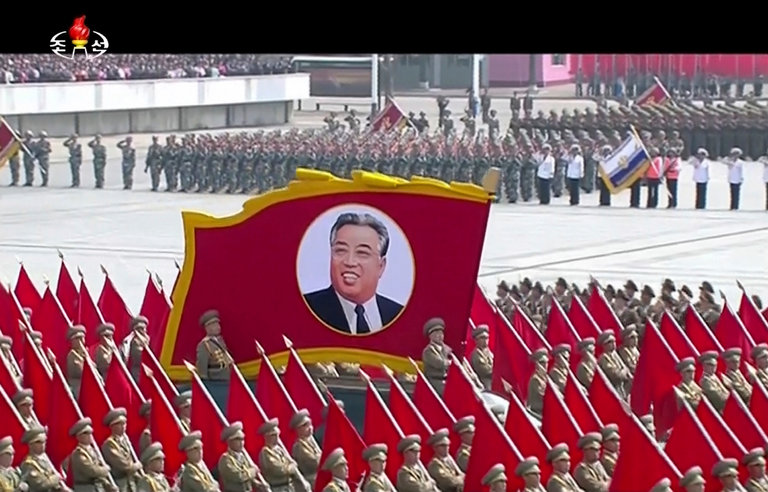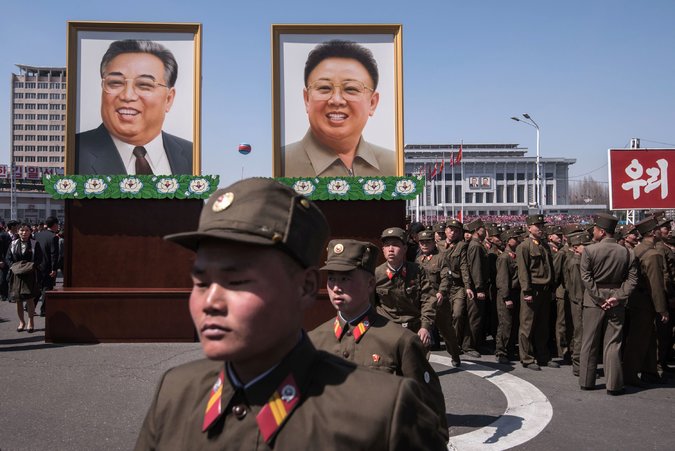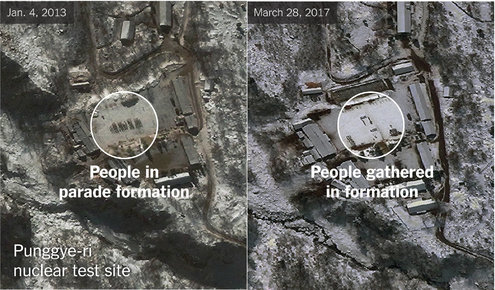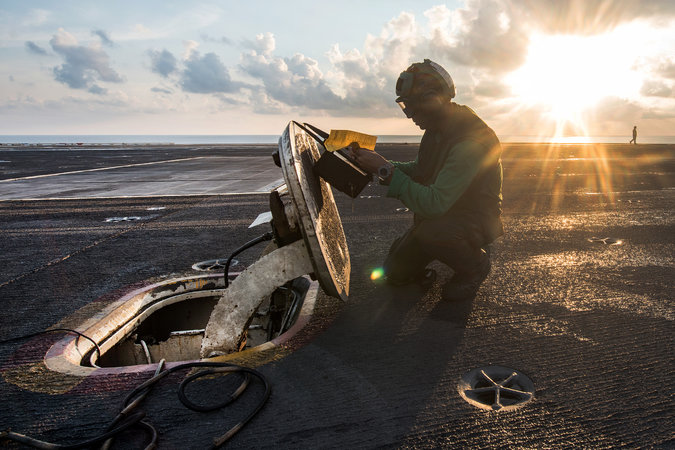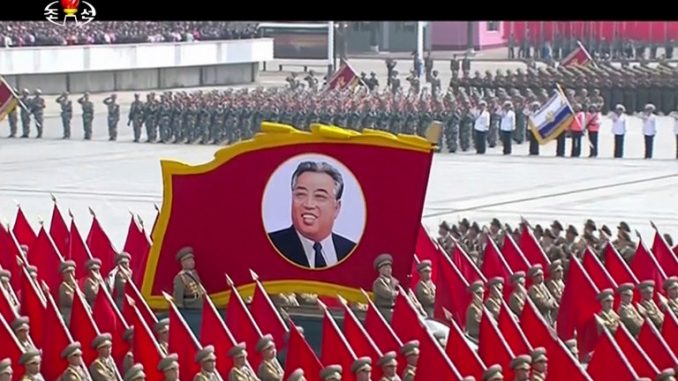
China warned Friday tensions on Korean Peninsula could spin out of control, as the North said it could test a nuclear weapon at any time — & a US naval group neared the peninsula, an effort to sow doubt in Pyongyang over how Trump might respond. “The US, South and North Korea are engaging in tit for tat, with swords drawn and bows bent, and there have been storm clouds gathering,” China’s foreign minister, Wang Yi, said in Beijing. The comments were unusually blunt from China — which has been trying to steer between the Trump demands for it to do more to stop North Korea’s nuclear weapons program and its longstanding reluctance to risk a rupture with the North that could result in the regime’s collapse and outbreak of a region-wide refugee problem. US experts said the remarks also reflected an effort by the Chinese to throw responsibility for what happens back on Washington, Here, a portrait of Kim Il-sung, the founding leader of North Korea, was carried during a parade in Pyongyang on Saturday.
China warned on Friday that tensions on the Korean Peninsula could spin out of control,
as North Korea said it could test a nuclear weapon at any time —
and a US naval group neared the peninsula — an American effort to sow doubt in Pyongyang over how President Trump might respond.
“The US, South and North Korea are engaging in tit for tat, with swords drawn and bows bent, and there have been storm clouds gathering,”
China’s foreign minister, Wang Yi, said in Beijing, according to Xinhua, the state news agency.
“If they let war break out on the peninsula, they must shoulder that historical culpability and pay the corresponding price for this,” Wang said.
The comments were unusually blunt from China, — which has been trying to steer
between the Trump administration’s demands for it to do more to stop North Korea’s nuclear weapons program
and its longstanding reluctance to risk a rupture with the North.
US experts said the remarks also reflected an effort by the Chinese to throw responsibility for what happens back on Washington,
after Trump declared, in several Twitter messages, that it was up to the Chinese to contain their neighbor and sometime partner.
In a telephone conversation with Trump on Wednesday, China’s president, Xi Jinping, also called for restraint.
But behind the scenes, officials said, Trump and Xi had reached some preliminary understandings, during their meeting at the president’s Mar-a-Lago resort a week ago,
about what the Chinese might do to change the behavior of the North’s leader, Kim Jong-un.
[ Even with the limited experience I have of negotiating with Chinese officials,
I think I can safely say that the US understanding in general — and that of Team Trump in particular — is shot through with wishful thinking and conscious mis-interpretation. ]
Portraits of Kim Il-sung, left, and Kim Jong-il, the first two leaders of North Korea, in Pyongyang, the capital, on Thursday. Kim Il-sung’s birthday is on Saturday, an occasion often marked by shows of military might. Credit Ed Jones/Agence France-Presse — Getty Images
Crackdown on 2nd-Tier Banks Most Unlikely – Either in Principle or Execution
According to officials who have seen notes of the conversations,
the Chinese have agreed to crack down on their second-tier banks that have helped finance the North’s trade.
But it is unclear what that crackdown would look like:
While much has been made by Trump about North Korean “boats” of coal that have been turned away by China,
the most recent statistics show a significant increase in overall trade between the two countries,
[ as we pointed out in an earlier post . ]
US officials contend that the two countries have also agreed to share some intelligence — a highly unusual step —
about suspected North Korean shipments of arms and other illicit goods.
[ As I said, lots of wishful thinking on the American side — especially with this group. ]
That would improve the chances that those shipments can be intercepted, perhaps when they make port calls.
[ Perhaps. ]
The Bush administration began such a program, called the Proliferation Security Initiative, more than a decade ago, but attention to it has waxed and waned.
[ If this is US / China “co-operation”, don’t stop making plans for a post-nuclear / Mad Max world. ]
The North Korean military issued a statement on Friday
threatening to attack major American military bases in South Korea, as well as the presidential Blue House,
warning that it could annihilate those targets “within minutes.”
North Korea Will Have Enough Weapons & Delivery Systems To Retaliate After Any US Strike
Administration officials flatly denied a report on NBC News that the US was planning for a pre-emptive strike ahead of any nuclear test.
[ At the very least, such a strike is being comprehensively war-gamed during the current US / S Korean exercises — at the very least. ]
It was unclear where US forces would strike, and the nuclear test site where the North has conducted its five previous tests would make a hard-to-hit target,
as noted in the previous piece and elsewhere, much of the North Korean armada is hidden in tunnels,
some of which remain clearly unknown to US & South Korean experts.
This means that — in case of a US attack — the North has more than enough ‘first-strike survivability”
to incinerate significant targets in both South Korea and Japan,
regardless of whether they can hit the US. ]
Moreover, they noted, [ the pathetically inadequate ] Vice President Mike Pence —
who is nothing more than a Ted Baxter-look-alike “yes man ” —
is scheduled to visit Seoul this weekend,
and it is almost impossible to imagine a strike occurring
while he was consulting with the South’s acting president about how to respond to the crisis.
Even if a nuclear test occurs this weekend or in coming weeks, officials say,
the response is likely to be diplomatic,
with a ramping up of economic pressure and the deployment of more military assets.
A carrier group, led by the aircraft carrier Carl Vinson, is headed to the waters off the peninsula. It includes Aegis cruisers with antimissile ability.
Interactive Feature
North Korea May Be Preparing Its 6th Nuclear Test — See Previous Post
Growing evidence suggests that North Korea may soon conduct another underground detonation in its effort to make nuclear arms.
That is notable because administration officials say they are more concerned about a test of an intercontinental ballistic missile that could reach the US —
a feat the North has never come close to accomplishing — than another nuclear test.
According to one official, it’s the combination of a missile and a warhead that is most worrisome.
The official, and others cited in this article, asked for anonymity to discuss a matter of national security.
The North, for its part, issued a statement that denounced what it called the Trump administration’s “maniacal military provocations,”
including the deployment of the carrier group.
“Nothing will be more foolish if the US thinks it can deal with us the way it treated Iraq and Libya, miserable victims of its aggression,
and Syria, which did not respond immediately even after it was attacked,”
a spokesman for the general staff of the North’s People’s Army said in a statement carried by Pyongyang’s official Korean Central News Agency.
North Korea’s vice foreign minister, Han Song-ryol, said on Friday
the US was “becoming more vicious and aggressive” under Trump
and that “we will go to war if they choose.”
A preflight operations check on the United States aircraft carrier Carl Vinson in the South China Sea last week. The carrier, along with other warships, neared the Korean Peninsula this week.
Han told The Associated Press that whether North Korea holds another nuclear test would be “something that our headquarters decides.”
But he added an ominous coda:
“At a time and at a place where the headquarters deems necessary, it will take place.”
The speculation about an imminent underground detonation arises from satellite photographs that show the test site is fully prepared,
and that holes into the site have been plugged, usually a last step to contain radiation.
But at times the North, knowing it is under space surveillance, has readied the site but waited to conduct the test.
North Korea Military Parade on Saturday Scares Japan and South Korea
On Saturday, with Kim Jong-un watching from a raised platform, North Korea began a military parade in central Pyongyang
to celebrate the 105th anniversary of the birth of his grandfather, Kim Il-sung, the North’s founding president.
The North sometimes uses such occasions to show off its military advances.
Japan is clearly examining worst-case scenarios.
The Japanese news media reported that the government’s National Security Council had been discussing
the possible evacuation of an estimated 57,000 Japanese citizens in South Korea, should war break out.
“We will take all necessary steps to protect our people’s lives and assets,” said Yoshihide Suga, Japan’s chief cabinet secretary.
The Kyodo News agency said the council was concerned about the possibility of North Korean refugees arriving in boats on its shores.
Prime Minister Shinzo Abe expressed concern Thursday that North Korea could have the ability to deliver missiles equipped with sarin,
the nerve agent whose recent use against civilians in Syria allegedly prompted Trump to order a missile strike there.
Russia, another neighbor of North Korea, echoed China on Friday in urging all parties to exercise caution.
A Kremlin spokesman, Dmitri S. Peskov, called on “all the countries to refrain from any actions that could amount to provocative steps,” Reuters reported.
In a phone call on Friday between the Russian foreign minister, Sergey V. Lavrov, and his Chinese counterpart, Wang,
both said they would try to revive talks over North Korea, according to the Chinese Foreign Ministry.
[ I doubt Trump’s US would attend such meetings, being correctly fearful of being outmaneuvered by China alone, or possibly in conjunction with Russia
Beyond the tactical measures, Trump’s US has no interest in talking with North Korea under any circumstances. ]
In South Korea, whose people have lived through saber-rattling involving the North for decades, there were few signs of panic.
Nonetheless, the South Korean Foreign Ministry warned on Friday that
if the North conducted another nuclear test or launched an intercontinental ballistic missile,
it would suffer an “unbearably strong punishment.”
All the major candidates in the South Korean presidential election set for next month
have called on the US NOT to do anything that might initiate war on the peninsula
without first seeking the consent of South Korea, its military ally,
[ which, of course, is the exact OPPOSITE of how Trump opreates . ]
In his remarks in Beijing, Wang said there was still hope for renewed negotiations with North Korea on its weapons program.
“There can also be flexibility about the form of renewed talks,” he said.
Why US / North Korea Talks Will Go Nowhere
Secretary of State “Empty Suit” Rex Tillerson, visiting Seoul in March,
said the US would not negotiate with the North
unless it first gave up both its nuclear and missile programs.
That was essentially a rejection of talks by the US, since the purpose of the negotiation would be to end those programs.
But the North has said it will never surrender what it calls its “deterrent” against American aggression,
and President Barack Obama never engaged in prolonged discussions out of concern the North was just playing for time.
The Chinese made much of their announcement two months ago that they were suspending coal imports from North Korea.
But while those shipments seem to have dried up,
Chinese overall trade rose 37.4% in the first quarter of 2017, compared with the same period in 2016,
as noted in a previous post.
Chinese news outlets reported on Friday that Air China, the country’s main international airline, would suspend flights to Pyongyang starting on Monday,
leaving only Air Koryo of North Korea operating regular flights between Pyongyang and Beijing or other Chinese cities.
The move appeared to have been in the works for some time;
NK News, a website about North Korea, reported last month that the suspension was likely,
saying that Air China’s services were underused and that its flights were often canceled.
Later, Air China issued a statement saying that it had not entirely abandoned the route from Beijing to Pyongyang,
and would arrange flights if there was enough demand.
Source: China Warns of ‘Storm Clouds Gathering’ in U.S.-North Korea Standoff – The New York Times
